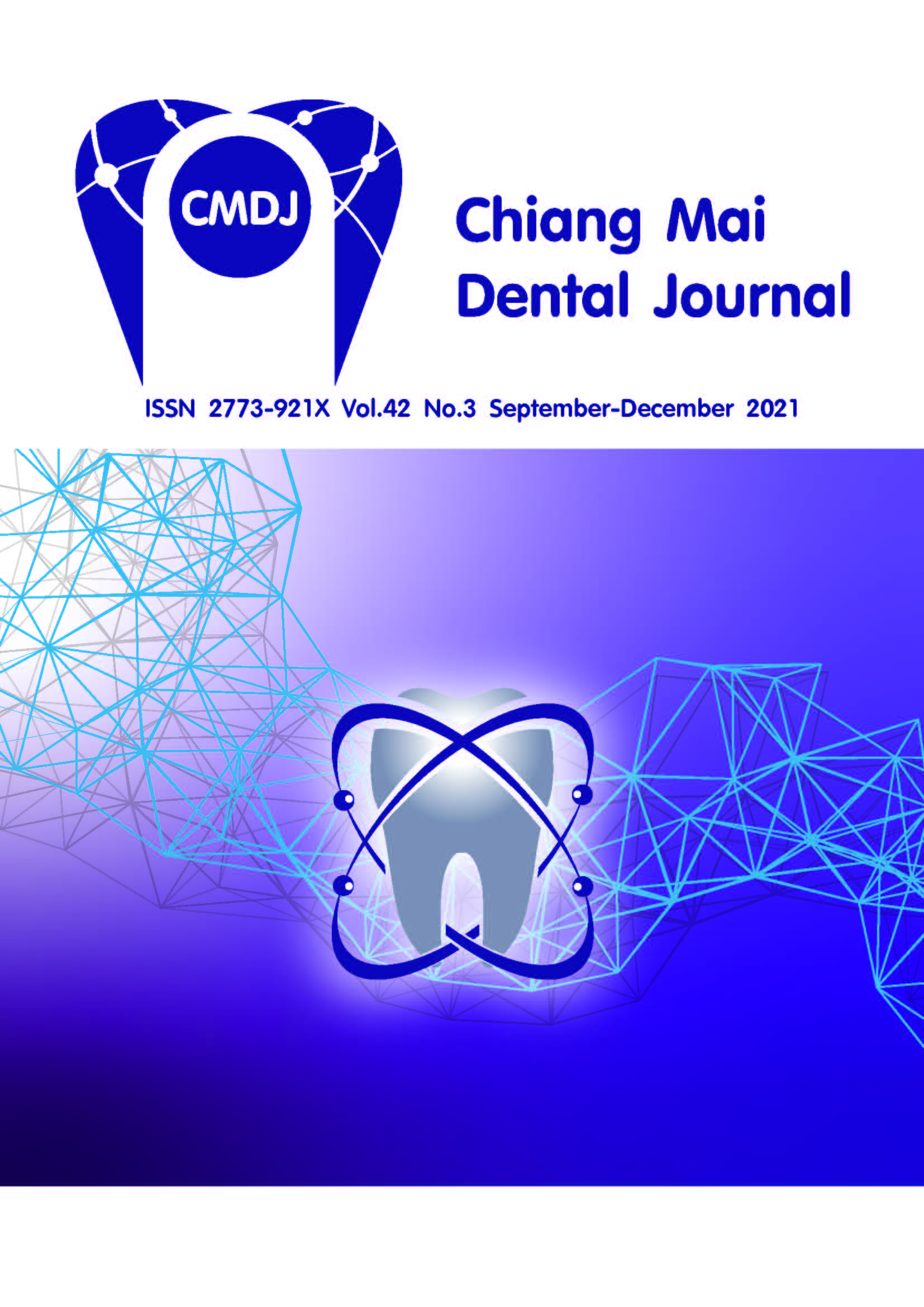Effectiveness of Maprang “Bouea macrophylla Griffith” seed extract against endodontopathogenic microorganisms in a multispecies bacterial-fungal biofilm.
Main Article Content
Abstract
Objective:This study aimed to assess the antimicrobial efficacy of seed extractderived from Bouea macrophyllaGriffith (Maprang wan)grown in Northern Thailand against Entercoccus faecalis,Streptococcus gordoniiandCandida albicans inplanktonic and multispecies biofilm.
Materials and methods:Agar diffusion and broth microdilution methods were performed to investigate the antimicrobial activities of ethyl acetate extract of Maprang wan seed against planktonic E. faecalis,S. gordoniiand C. albicans.Growth curves of E. faecalis,S. gordoniiand C. albicansin 1:1:1and1:1:0.1ratio, respectively) were performed to measure the appropriate ratio of the species within biofilm. Multispecies of E. faecalis,S. gordoniiand C. albicansbiofilms were grown in RPMI for 48 hours at 37°C. Following this, the biofilms were exposed to 25 mg/mL of Maprang seed extracts. 0.02 mg/mL chlorhexidine was used as the positive control and RPMI as the negative control. After exposure, time-kill assay was conducted to evaluate time-point of the extract which showed bactericidal and fungicidal effects. The colony forming unit (CFU) data were analysed with one-way ANOVAand Dunnett's test (p<0.05).
Results:Maprang seed extract demonstrated the antimicrobial activity against planktonic and multispecies E. faecalis,S. gordoniiand C. albicans. The time kill assay showed a time dependent action of Maprang seed extract, itdemonstrated significant reduction of viable organisms at the time periods.
Conclusions:Maprang seed extract had antibiofilm property against multispecies E. faecalis,S. gordoniiand C. albicansbiofilms. The antimicrobial activity of the extract was comparable to chlorhexidine. Maprang seed extract has potential as a novel antimicrobial agent and could be used to treat superficial infections or as aroot canal medicament.
Article Details
References
2. Stuart CH, Schwartz SA, Beeson TJ, Owatz CB. Enterococcus faecalis: its role in root canal treatment failure and current concepts in retreatment. J Endod 2006; 32(2):93-8.
3. Park O-J, Kwon Y, Park C, So YJ, Park TH, Jeong S, et al. Streptococcus gordonii: Pathogenesis and Host Response to Its Cell Wall Components. Microorganisms 2020; 8(12):1852.
4. de Paz LC, Svensäter G, Dahlén G, Bergenholtz G. Streptococci from root canals in teeth with apical periodontitis receiving endodontic treatment. Oral Surg Oral Med Oral Pathol Oral Radiol Endod 2005; 100(2):232-41.
5. Kim J, Sudbery P. Candida albicans, a major human fungal pathogen. The Journal of Microbiology. 2011;49(2):171-7.
6. Rautemaa R, Ramage G. Oral candidosis–clinical challenges of a biofilm disease. Crit Rev Microbiol 2011; 37(4):328-36.
7. Hong B-Y, Lee T-K, Lim S-M, Chang SW, Park J, Han SH, et al. Microbial analysis in primary and persistent endodontic infections by using pyrosequencing. J Endod 2013; 39(9):1136-40.
8. Wargo MJ, Hogan DA. Fungal—bacterial interactions: a mixed bag of mingling microbes. Curr Opin Microbiol 2006; 9(4):359-64.
9. Bamford CV, d'Mello A, Nobbs AH, Dutton LC, Vickerman MM, Jenkinson HF. Streptococcus gordonii modulates Candida albicans biofilm formation through intergeneric communication. Infect Immun 2009; 77(9):3696-704.
10. Garsin DA, Lorenz MC. Candida albicans and Enterococcus faecalis in the gut: synergy in commensalism? Gut microbes 2013; 4(5):409-15.
11. Hargreaves K. Cohen's Pathways of the Pulp Expert Consult. 10th. Elsevier; 2010.
12. Siqueira Jr JF, Paiva SS, Rôças IN. Reduction in the cultivable bacterial populations in infected root canals by a chlorhexidine-based antimicrobial protocol. J Endod 2007; 33(5):541-7.
13. Khademi Aa, Mohammadi Z, Havaee A. Evaluation of the antibacterial substantivity of several intra‐canal agents. Aust Endod J 2006; 32(3):112-5.
14. Dechsupa N, Kantapan J, Tungjai M, Intorasoot S. Maprang “Bouea macrophylla Griffith” seeds: proximate composition, HPLC fingerprint, and antioxidation, anticancer and antimicrobial properties of ethanolic seed extracts. Heliyon 2019; 5(7):e02052.
15. Thummajitsakul S, Silprasit K. Genetic differentiation and antioxidant activities of Bouea macrophylla Griffith in Nakhon Nayok province. Appl Biol Chem 2017; 60(1):41-7.
16. Nguyen NH, Nguyen TT, Ma PC, Ta QTH, Duong T-H, Vo VG. Potential Antimicrobial and Anticancer Activities of an Ethanol Extract from Bouea macrophylla. Molecules 2020; 25(8):1996.
17. Montelongo-Jauregui D, Srinivasan A, Ramasubramanian AK, Lopez-Ribot JL. An in vitro model for oral mixed biofilms of Candida albicans and Streptococcus gordonii in synthetic saliva. Front Microbiol 2016; 7:686.
18. Cavazana TP, Pessan JP, Hosida TY, Monteiro DR, Delbem ACB. pH changes of mixed biofilms of Streptococcus mutans and Candida albicans after exposure to sucrose solutions in vitro. Arch Oral Biol 2018; 90:9-12.
19. Clinical, Institute LS. Reference method for broth dilution antifungal susceptibility testing of yeasts. Clinical and Laboratory Standards Institute Wayne, PA; 2008.
20. Clinical, Institute LS. Performance standards for antimicrobial susceptibility testing. Clinical and Laboratory Standards Institute Wayne, PA; 2017.
21. Keepers TR, Gomez M, Celeri C, Nichols WW, Krause KM. Bactericidal activity, absence of serum effect, and time-kill kinetics of ceftazidime-avibactam against β-lactamase-producing Enterobacteriaceae and Pseudomonas aeruginosa. Antimicrob Agents Chemother 2014; 58(9):5297-305.
22. Balouiri M, Sadiki M, Ibnsouda SK. Methods for in vitro evaluating antimicrobial activity: A review. J Pharm Anal 2016; 6(2):71-9.
23. Sjögren U, Figdor D, Spångberg L, Sundqvist G. The antimicrobial effect of calcium hydroxide as a short‐term intracanal dressing. Int Endod J 1991; 24(3):119-25.
24. Kucharíková S, Tournu H, Lagrou K, Van Dijck P, Bujdakova H. Detailed comparison of Candida albicans and Candida glabrata biofilms under different conditions and their susceptibility to caspofungin and anidulafungin. J Med Microbiol 2011; 60(9):1261-9.
25. Coenye T, Nelis HJ. In vitro and in vivo model systems to study microbial biofilm formation. J Microbiol Methods 2010; 83(2):89-105.
26. Sedgley CM, Lee EH, Martin MJ, Flannagan SE. Antibiotic resistance gene transfer between Streptococcus gordonii and Enterococcus faecalis in root canals of teeth ex vivo. J Endod 2008; 34(5):570-4.
27. Lima KC, Fava LR, Siqueira Jr JF. Susceptibilities of Enterococcus faecalis biofilms to some antimicrobial medications. J Endod 2001; 27(10):616-9.
28. Paju S, Scannapieco F. Oral biofilms, periodontitis, and pulmonary infections. Oral Dis 2007; 13(6):508-12.
29. del Carpio-Perochena A, Bramante CM, de Andrade FB, Maliza AGA, Cavenago BC, Marciano MA, et al. Antibacterial and dissolution ability of sodium hypochlorite in different pHs on multi-species biofilms. Clin Oral Investig 2015; 19(8):2067-73.


